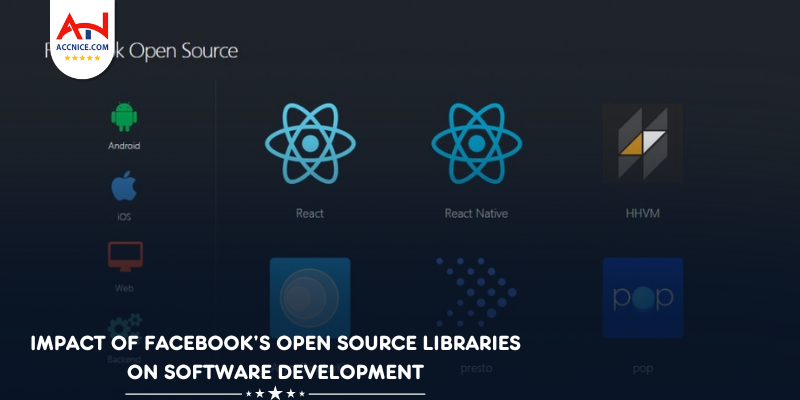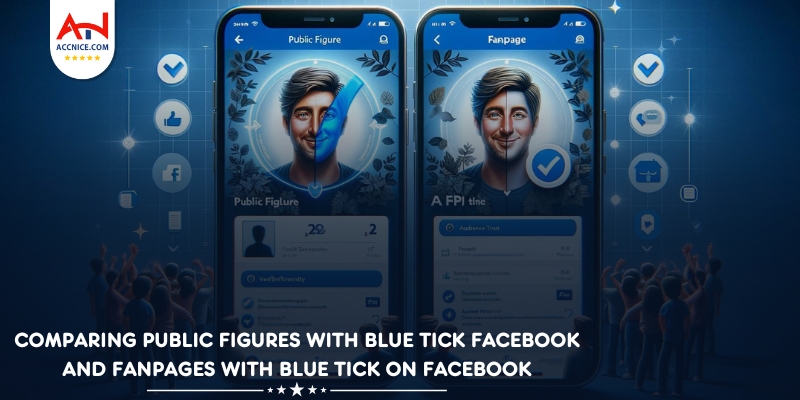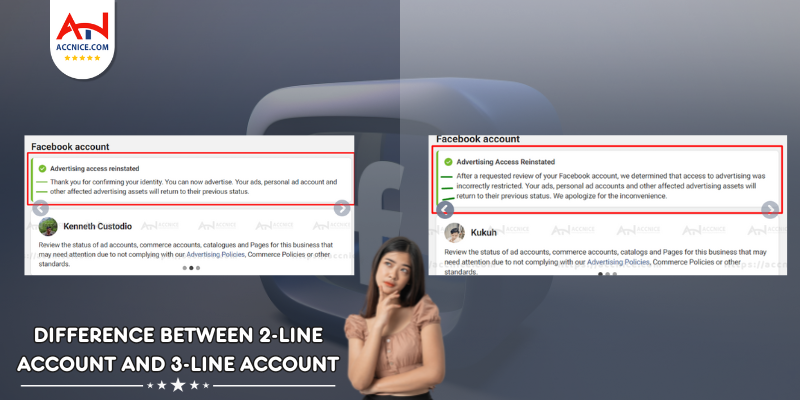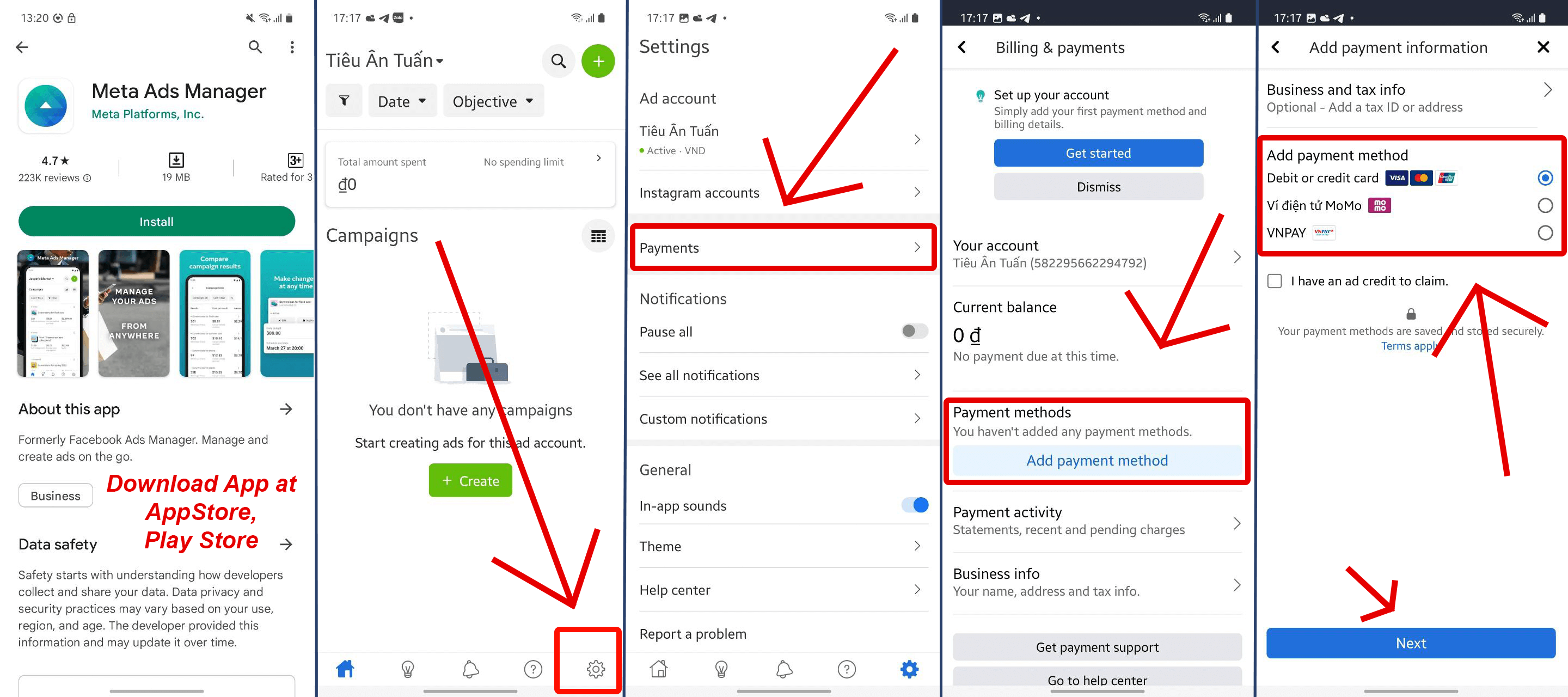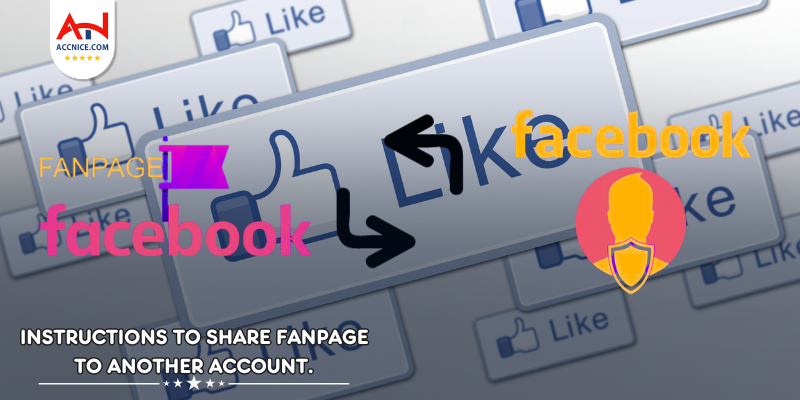Impact of Facebook’s Open Source Libraries on Software Development
165 vỉew
Writing date: 2024-05-15 11:21:03

In recent years, Facebook has emerged as a significant contributor to the open source community, providing countless libraries and tools that have had a profound influence on modern software development practices. This article by Accnice dives into the notable impact of Facebook's open source initiatives on the broader software development landscape.
Facebook’s Open Source Initiatives
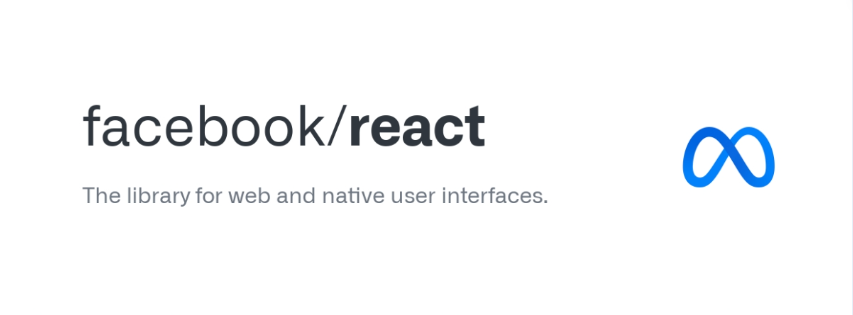
Here are some notable open source initiatives from Facebook:
-
React: Facebook's JavaScript library for building user interfaces has been one of its most significant open source contributions. React has gained widespread adoption in the web development community for its component-based architecture and efficient rendering capabilities.
-
React Native: Extending the principles of React to mobile app development, React Native enables developers to build native mobile apps using JavaScript and React. It has become a popular choice for cross-platform mobile development, allowing for code reuse across iOS and Android platforms.
-
PyTorch: Developed by Facebook's AI Research (FAIR) lab, PyTorch is a widely used open source machine learning library known for its flexibility and ease of use. PyTorch has gained popularity among researchers and practitioners for its dynamic computational graph and extensive library support.
-
Detectron2: Facebook AI Research's next-generation object detection and segmentation system, Detectron2, is built on top of PyTorch. It provides state-of-the-art algorithms for computer vision tasks and is highly modular and customizable.
-
GraphQL: Originally developed by Facebook in 2012, GraphQL is an open-source query language for APIs. It enables clients to request only the data they need from servers, leading to more efficient and flexible API interactions.
-
Prophet: Facebook's forecasting tool for time series data, Prophet, is available as an open source library. It simplifies the process of time series forecasting by providing intuitive parameters and automatic trend detection.
-
Yarn: While not solely a Facebook project, Yarn is an open-source package manager for JavaScript that was developed collaboratively by Facebook, Google, Exponent, and Tilde. It offers faster and more reliable package installation compared to npm.
These initiatives reflect Facebook's commitment to advancing technology through collaboration and knowledge-sharing, contributing to the growth and innovation of the broader developer community.
Enhanced Collaboration and Innovation
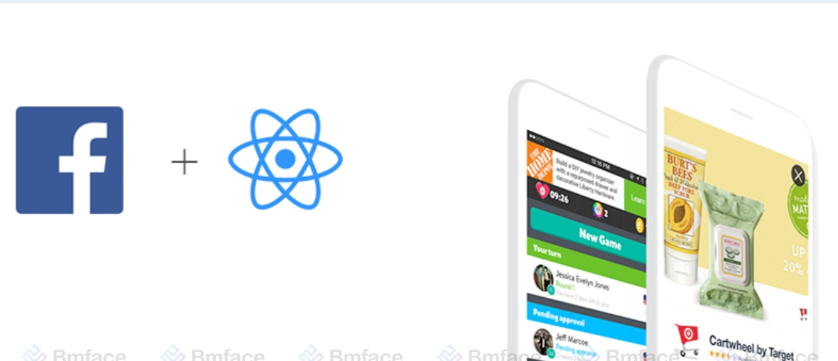
Absolutely, the open-source nature of Facebook's libraries promotes a culture of collaboration and innovation in several ways:
-
Community Contributions: By making their libraries open source, Facebook invites developers from around the world to contribute improvements, fixes, and new features. This collaborative effort results in more robust and versatile tools that benefit the entire community.
-
Knowledge Sharing: Open-source projects serve as valuable learning resources for developers. They can study the codebase, learn best practices, and understand how large-scale projects are structured and managed, fostering continuous learning and skill development.
-
Customization and Extension: Developers can customize Facebook's libraries to suit their specific needs or extend their functionality for niche use cases. This flexibility encourages experimentation and innovation, leading to the development of novel solutions and applications.
-
Feedback Loops: The open-source model facilitates direct communication between developers and users. Feedback, bug reports, and feature requests from the community help identify areas for improvement and drive the evolution of the libraries in directions that align with real-world needs.
-
Ecosystem Growth: As developers contribute to and build upon Facebook's libraries, they enrich the broader ecosystem of tools and frameworks in the tech industry. This diversity fosters healthy competition, drives innovation, and ensures that developers have access to a wide range of options for their projects.
Overall, the collaborative nature of open-source development accelerates innovation by leveraging the collective expertise and creativity of a global community of developers.
Accelerating Development Cycles

Absolutely, leveraging Facebook's open-source libraries can significantly accelerate development cycles for several reasons:
-
Proven Solutions: Facebook's libraries are built on the foundation of real-world usage within the company. They embody best practices, optimizations, and battle-tested solutions for common challenges faced in software development. By adopting these libraries, developers can avoid reinventing the wheel and benefit from proven approaches to solving complex problems.
-
Robust Foundations: Facebook's libraries often provide robust foundations for building applications. They offer well-defined APIs, clear documentation, and established patterns that streamline development workflows. Developers can rely on these foundations to build upon and extend functionality without getting bogged down by low-level implementation details.
-
Community Support: Open-source projects typically have vibrant communities of developers who contribute code, provide support, and share knowledge. By tapping into these communities, developers can access a wealth of resources, including forums, documentation, tutorials, and code samples. This support network accelerates the learning curve and helps overcome obstacles more efficiently.
-
Interoperability: Facebook's open-source libraries are often designed to work seamlessly with other popular technologies and frameworks. They integrate well with industry-standard tools, platforms, and services, enabling developers to leverage existing infrastructure and ecosystem components. This interoperability reduces integration efforts and accelerates time-to-market for new features and products.
-
Continuous Improvement: Open-source projects are subject to continuous improvement through community contributions and feedback. As developers encounter new use cases, edge cases, and performance bottlenecks, they can contribute enhancements and optimizations back to the project. This collective effort results in a virtuous cycle of improvement, ensuring that the libraries evolve to meet the changing needs of developers and businesses over time.
Overall, by leveraging Facebook's open-source libraries, developers can expedite their development cycles, reduce time-to-market, and focus more on delivering value-added features and functionalities to end users.
Driving Standardization and Interoperability
Indeed, Facebook's open-source initiatives have contributed significantly to driving standardization and interoperability within the software development community. Here's how:
-
Common Frameworks: Facebook's open-source libraries often promote the adoption of common frameworks and methodologies for solving specific problems. For example, libraries like React have become de facto standards for building user interfaces in the web development community. By establishing common frameworks, Facebook helps developers align on best practices and conventions, reducing fragmentation and accelerating development workflows.
-
Interoperable Solutions: Many of Facebook's open-source projects are designed to work seamlessly with other popular technologies and platforms. For instance, libraries like PyTorch and React Native integrate well with existing ecosystems, enabling developers to leverage a wide range of tools and services. This interoperability fosters collaboration between disparate systems and promotes the development of cohesive, integrated solutions.
-
Open Standards and Protocols: Facebook's contributions to open standards and protocols, such as GraphQL, have played a crucial role in driving interoperability across the software stack. By advocating for open standards, Facebook encourages the adoption of common data formats and communication protocols, making it easier for systems to exchange information and interact with each other.
-
Community Collaboration: Facebook's open-source projects benefit from contributions and feedback from a diverse community of developers worldwide. This collaborative approach fosters innovation and ensures that solutions are developed with interoperability in mind. Developers can build upon existing libraries and contribute enhancements that improve compatibility with other systems and technologies.
-
Reduced Vendor Lock-in: By embracing open-source solutions, developers can avoid vendor lock-in and maintain flexibility in their technology stack. Facebook's commitment to open-source principles empowers developers to choose the tools and platforms that best suit their needs, without being tied to proprietary software or closed ecosystems.
Overall, Facebook's open-source initiatives have played a pivotal role in promoting standardization and interoperability within the software development community. By fostering collaboration, advocating for open standards, and providing interoperable solutions, Facebook has contributed to the creation of a more interconnected and cohesive software ecosystem.
Empowering the Developer Community
Absolutely, Facebook's commitment to empowering the developer community through open-source initiatives has been remarkable. Here's a summary of how these efforts have made a significant impact:
-
Knowledge Sharing and Education: Facebook's involvement in educational initiatives, such as online courses, tutorials, and documentation, helps developers learn and master new technologies. By providing accessible resources, Facebook empowers developers to enhance their skills and stay up-to-date with the latest trends in software development.
-
Community Engagement: Through participation in conferences, meetups, and online forums, Facebook fosters a vibrant community where developers can connect, share ideas, and collaborate on projects. This community-driven approach encourages knowledge exchange and peer learning, enriching the collective expertise of developers worldwide.
-
Access to Advanced Technologies: By open-sourcing cutting-edge tools and frameworks, Facebook democratizes access to advanced technologies that were previously available only to a select few. This democratization lowers the barrier to entry for developers, enabling them to leverage powerful tools and build innovative solutions without significant investment.
-
Catalyst for Innovation: Facebook's open-source contributions serve as a catalyst for innovation, inspiring developers to push the boundaries of what's possible. By providing a platform for experimentation and exploration, Facebook encourages creative thinking and facilitates the development of groundbreaking technologies that drive progress in various industries.
Conclusion: Facebook's commitment to empowering the developer community through open-source initiatives has had a transformative impact on software development worldwide. By fostering collaboration, providing educational resources, and democratizing access to advanced technologies, Facebook has helped shape the future of software development and accelerated innovation across the globe.
For more insights and updates on effective social media strategies, make sure to follow Accnice and our tutorial blog, where we share the latest and most effective content marketing tips.


